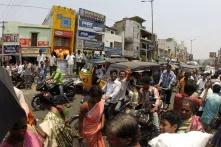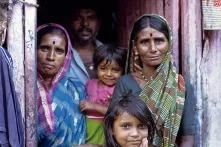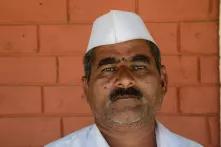
We were rounded up by e-mail. Meeting point: A gas station in the industrial city of Pune, about 100 kilometers east of Mumbai. I meet up with a small group of young people, whom I recognize by their white sailor hats. The long, canvas cap is the symbol of the new Common People's Party, or Aam Aadmi Party in Hindi. The political newcomer, who garnered more than a third of the vote in their first ballot appearance during elections in the capital city of New Delhi last December, is the great unknown in this year's general election. No one expects them to win, but they have the potential to spoil the victory for the other parties. Since this is the Aam Aadmi Party's first time to compete in national elections, no one can really say how high their chances of winning really are.
While waiting at the gas station, I meet Arvind, a software engineer; Sushil, who is studying pharmacy; Purnima, a nursing student, and her friend Aarti. They are ready to spend their free time after work visiting a slum on behalf of the party to woo voters. The four young people represent a new awakening in a country frozen in political rituals and constraints.
After at least a half hour delay, two older party officials arrive, carrying materials from the party office: a tambourine, a portable megaphone, and two thin stacks of handouts. "We don't have many handouts, go sparingly with them," instruct their assistant. Then we head out. "The common man is awakened, the corrupt has taken flight," chant the campaign workers as they raise their fists in the air.
We turn off from the road onto a lane that is just wide enough for two people. Tiny houses, usually with just one room, line the way. Occasionally, some volunteers from the group stop and try to engage the slum dwellers in a conversation on their doorsteps: "The government is building airports and wide streets, but is that development? We need access to education and healthcare, this is development; and for this, we have to fight together… We do not need a so-called 'leader,' we from the AAP work together with the people for improvement."
Our little group attracts more and more attention. People step out of their houses and watch the campaign circus with curiosity and reserve. Dogs bark, some children accompany us part of the way, cheering and screaming. My acquaintance, Annu, who is leading the team, comments, "The people are very politically awakened. They ask me, 'What will your party do for us? Do you even have enough people to govern?' I tell them that this election provides a great opportunity to change the situation. If we miss it, the next five years will continue as it has been."
We reach a small square in the middle of the confusing sea of houses; an opportunity to make a speech that will lure a few listeners, hope the campaign workers. The speaker gives his all, but the audience refuses to engage and watches the scene from a safe distance. "It is time that we all take to the street and do something," urged the speaker. "We must fight together; the country is going through difficult times. We, the common people, may have no power, but we have a vote in the election and we have to use it now!"
The little square remains mostly empty. After a while, our group moves on. I lose all sense of orientation in the maze of alleyways. From time to time, the ones in charge inquire about which residential square we are currently in. Apparently they are going by a plan that should canvass as much residential ground as possible. After more than two hours, the area has been covered, and the campaign workers dissipate until the next meeting. They can claim a small success: Two young people from the slum asked for the address of the party office. They would like to sign on as campaign workers.
Can the voters be bought?
With around 800 million eligible voters, this year's parliamentary elections in India will be the largest popular vote of all time. The mega-event presents enormous challenges to the administrators. More than 900,000 polling stations must be established in a country with the geographical dimensions of Western Europe.
A three-member election commission in the capital, New Delhi, along with sub-committees in all 28 states, oversees this mega-event. They command an army of 1.3 million officials who are organizing the voting sites. With the announcement of the election date on March 5, a special code of conduct prohibiting any further political activity, such as the adoption of laws or the initiation of large development projects, entered into force. This is meant to prevent the incumbent government from trying to influence voting behavior through short-term and potentially costly gifts to the people. For serious violations, the Election Commission can disqualify a party or a politician from the election. However, they have long since found other ways to corrupt the voters, as Ranjit Gadgil, a civil rights activist in Pune, explains, "Political parties spend a lot of money to buy votes. They distribute cash, food, alcohol, and even organize junkets. The Election Commission, unfortunately, has not been able to halt this activity. But on the other hand, the voters are not particularly impressed by this; while most of them may accept the illegal gifts, they still make their decisions based on what they think is best for them."
Thanks to the new Aam Aadmi Party's campaign against corruption, the influence of powerful businessmen in politics, such as the financing of election campaigns, is now increasingly being debated. Civil rights activist Ranjit Gadgil expresses somewhat sharp criticism, "Campaign finance in India is anything but transparent. Nobody knows how much money large companies donate to parties. Of course, a lot of dirty money is also in play. And monitoring this is very difficult without clear legal rules. Although the Election Commission has set an upper limit on campaign spending, many donations are awarded under the table."
People's movement against corruption
Two years ago, a campaign against corruption stirred the country. Hundreds of thousands of people flocked to rallies in big cities, where farmer Anna Hazare and his strategist, Arvind Kejriwal held inflammatory speeches against pervasive corruption. Prior to this, several multi-million dollar scandals exposed cronyism between powerful industrialists and high-ranking politicians to the public spotlight. Hazare and Kejriwal's energetic attempt to get the Parliament to adopt a far-reaching law to detect and monitor corruption scandals failed. The movement's two protagonists parted ways. Anna Hazare returned to his native village near the mega-city of Pune, while Arvind Kejriwal called the Aam Aadmi Party to life. He adopted the distinctive, white headgear from his former political comrade as his trademark and added the words, "I am a common citizen."
In Pune, home of Anna Hazares, pharmacist Subhash Ware is running for office under the new opposition party. He has worked for many years with the socialist initiative Rashtriya Seva Dal, which advocates on behalf of the most socially vulnerable part of the population. It was not easy for the candidate, who is in his mid-fifties and has a slight build, to find time for an interview in the middle of an election campaign. "My campaign is funded entirely by private donations. It's not enough, but we also need to be visible. We cannot organize any large-scale events like our financially strong rivals, but the people actively support us."
Subhash Ware's campaign is supported by the enthusiasm of his assistants, rather than a plump bank account. There is a revolt taking place in society; according to the candidate, many people are awaking from years of political apathy. "Building up a new party in this large country is a daunting task, but we arise from the people. Thousands of young people already took to the streets during the movement against corruption to support us. Now many are coming to us to help with campaigning. There is a new political awakening among the youth and the middle class. That is the foundation of our success."
Most voters view the new party with skepticism. "Will they even be capable of taking over political responsibility?" ask many. "The party fights against corruption, but what is their position on economic and foreign policy issues?" wonder others. The political newcomer has in fact not established a position on many issues, and its election platform remains vague and cliché-ridden in some areas. In his talks, candidate Subhash Ware tries to dispel doubts about the scope and political maturity of his party, "Granted, the anti-corruption movement was driven mainly by the middle class, but since the founding of the Aam Aadmi Party, many activists with strong ties to the countryside have joined us. They build our bonds to rural society and contribute to the formation of our views. For example, there is Medha Patkar, who became known nationwide as the organizer of the protest movement against the Narmada dams. She is running for office in Mumbai under our party. In other parts of India, activists from the National Alliance of People's Movements network are also joining our party. Through them, we have a presence in numerous rural areas. Our party may be very young, but many of our members have an abundance of experience. My friend Medha Patkar and I have been in politics for more than thirty years!"
In Pune, and elsewhere, the new party hopes especially for votes from the poor. Therefore, they are focusing their campaign in urban slums. Most slum inhabitants are far removed from major policy issues such as economic liberalization or the rivalry with arch-enemy Pakistan. High inflation and pervasive corruption is what makes life for the poor especially difficult. Therefore, candidate Subhash Ware has very populist solutions prepared: "I want to dedicate myself mainly to the problems of this city. The city schools must be better, as well as the public hospitals. Education must be available for free to everybody, as should good health care. Public transportation needs to be urgently improved. We want to decentralize garbage disposal, together with the citizens of the city. They should be able to take on more responsibility and participate in the decision-making process. In addition, we must urgently tackle the issue of police reform. Most of the police are under considerable stress. We want to reduce their burden and raise their awareness about women's rights so that citizens can feel safe again. These are our priorities!"


